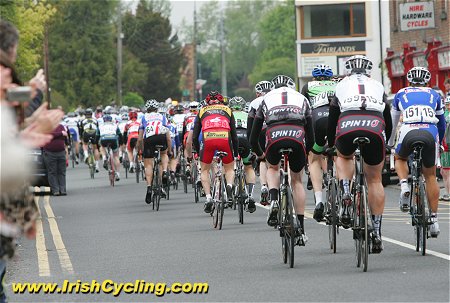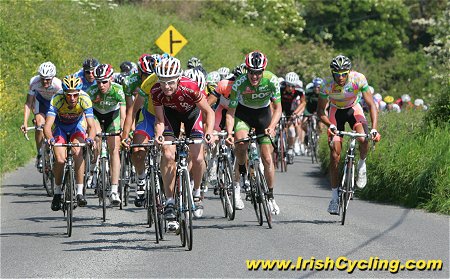
|
 |
|
Last Updated: 3 Jul 2021 - 10:47:10 AM |
How to Recover and Get Major Benefits from the Ras
By Paddy Doran
30 May 2012,
|
Email this article
|
The An Post Ras 2012
The 2012 An Post Ras has been another very competitive Ras, with high speed stages each day by tough and fit cyclists, great crowds spectating, a great Sponsor and a very welcome sunny week.
The unique style of the event which has been nurtured and maintained with great care by Dermot Dignam and his Ras Team give Irish riders who work and train part time the opportunity to participate with full time professionals.
 |
| The riders head off from Dunboyne on the start of the 2012 An Post Ras |
Participating in the same event with the pros also creates huge challenges for the part time home riders. The riders rose to the challenge very well, as can be seen by the high number of finishers. 163 riders started out in Dunboyne and 146 finished in Skerries last Sunday
Over the last number of years the high calibre of the riders participating have been verified on numerous occasions with some of the riders going on to race successfully at the very pinnacle of the sport like former Ras Winner and now World champion Tony Martin.
So it is a huge challenge, but also a great opportunity for Irish part time riders to ride races with these world class riders.
 |
| After eight days of racing the An Post Ras finale is fought out on the Skerries circuit over the Blackhills in north county Dublin |
DEMANDS OF THE RACE
The race places huge demands on riders bodies and minds and we will look at some of these and the recovery times for them in this article.
DIGESTIVE SYSTEM
If we were to use as an example a rider of about 70 kgs who has completed the race you will see that they used an average 4500 to 5000 calories per day to get through the event. On the hilly days in Donegal that may have risen closer to 7000 calories. That's a lot of eating and drinking and gets the digestive system working very hard and puts a very large strain on it.
So give your digestive system a chance to settle down by eating foods that are easily digested, high in nutrient value and energy in the first few days after the Ras .
IMMUNE SYSTEM
This is challenged daily during the Ras from the physical and psychological stress. Some riders pick up colds and chest infections from the lowered immune system.
MUSCLES TENDONS
The loads on rider bodies with the stress and strain of turning big gears very fast when the race is flat out, and climbing steep hills when fatigued gradually break down muscles and put strain on tendons. .
PSYCHOLOGICAL STRESS
For some riders the strain of being in a new environment with all the atmosphere of a major international competition with newspaper, radio, , TV reporter, cameras, very large crowds and the riders own and family and teams expectations can create a high stress level each day.
There is also the stress of holding on to that wheel in front of you or getting dropped very far away from the stage finish and as Seamus Kennedy once described it to me " having to listen to the birds whistling for the rest of the stage"
So all of this takes a toll on the rider by the time they arrive at the finish line in Skerries, physically and mentally they will not be the same strong rider that began the Ras eight days ago.
GOING TO A HIGHER LEVEL
With the correct recovery programme the rider can get back to the condition they were in at the beginning of the Ras and even higher because of the High loads they have endured during the Ras.
So what's the best approach for the part time rider following the Ras?
To achieve Full recovery of all the bodies systems before returning to racing and very intensive training is extremely important. The reason for this is that the intensive loading of the body too soon will disrupt the muscles and other systems recovery.
RECOVERY TIMES
Heres some examples of Timescale for recovery of the different systems and what to do to assist recovery
DAY 1: Rehydration should be complete and refilling of the liver glycogen stores should be complete by the end of the first day. What to do replace fluids fluids and carbohydrate immediately following the event and throughout the following day,
Day 2 to 7: Refilling of muscular glycogen and fat stores. Note that this will take up to seven days in some instances. Consuming a diet with a high percentage of carbohydrate and training at low intensity (recovery Training) will assist this process. So gradually increase the distance of the cycling sessions keep the intensity low, get plenty of rest a good diet and avoid races.
Day 3 to 10: Gradual recovery of muscles to full ability. Riders can now train at easy endurance pace and include low intensity strength efforts. So medium to long cycling sessions at low to medium intensity should now be included. Some intensive sessions can now be included near the end of this period. .Gentle stretches, light massage and warm baths may also help
Day 7 to 21: Full recovery of psychological and physical ability as all the fatigue from the Ras is removed. The rider can gradually return to full training and competition programme. Good sleep, light massages, progressive increase in training volume and intensity with a well-balanced diet will help the process.
As you can see the recovery time of the systems varies according to the demands on the rider. The amount of physical and psychological stress on the rider is related to their Pre Ras training volumes and intensity and the loads that the Ras Produces.
For example a professional who is conditioned to 20- 30+ hours racing / training per week will recover fairly quickly and may be ready for racing in a week following the Ras.
For a rider who has only trained an average of 10-12 hours per week recovery will be at the outer end of the ranges or beyond. For a rider who trained an average of twenty hours per week pre Ras recovery will be at the lower end of the ranges and so on according to the amount of pre Ras Training hours.
RESUMING FULL TRAINING
How to judge when you are ready to resume full training - Feeling fresher on the bike - Enthusiasm for training � Sleeping well - reduction of muscle soreness (walking up stairs for example) these are some of the main signs that you are recovered.
POWER METERS A ND HEART RATE MONITORS
THESE can give an indication of recovery or lack of recovery. If you have good knowledge of your power output and how your heart rate usually reacts to exercise you can monitor those values and train accordingly as they return to normal values.
If your exercise heart rates are reduced and your power out puts are lower than usual train easy / steady until the power and heart rates return to the normal values.
SUMMARY
If you train too hard too soon or stop training completely for a few weeks after the Ras you will not make the fitness gains and your performance levels will return to pre Ras levels.
If you do everything well for the first two weeks after the Ras you can expect increased performance levels from 2 to 3 weeks after the last stage of the Ras.
Best wishes for the rest of the season
|
|
 |

|